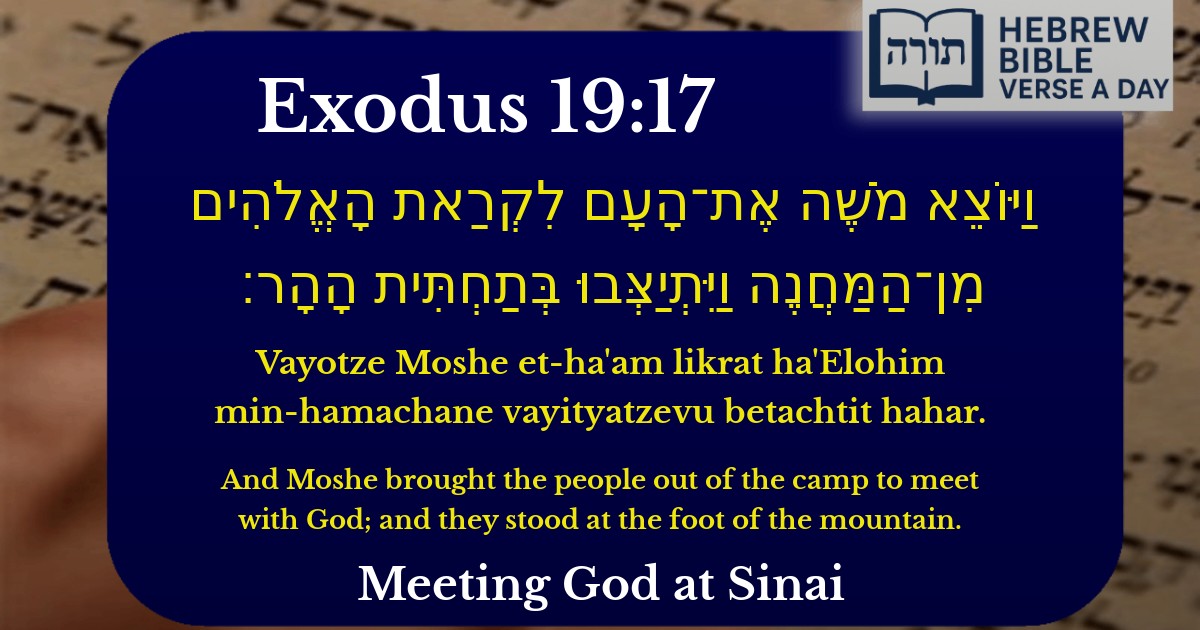Join Our Newsletter To Be Informed When New Videos Are Posted
Join the thousands of fellow Studends who rely on our videos to learn how to read the bible in Hebrew for free!
Hebrew Text
וַיּוֹצֵא מֹשֶׁה אֶת־הָעָם לִקְרַאת הָאֱלֹהִים מִן־הַמַּחֲנֶה וַיִּתְיַצְּבוּ בְּתַחְתִּית הָהָר׃
English Translation
And Moshe brought the people out of the camp to meet with God; and they stood at the foot of the mountain.
Transliteration
Vayotze Moshe et-ha'am likrat ha'Elohim min-hamachane vayityatzevu betachtit hahar.
Hebrew Leining Text
וַיּוֹצֵ֨א מֹשֶׁ֧ה אֶת־הָעָ֛ם לִקְרַ֥את הָֽאֱלֹהִ֖ים מִן־הַֽמַּחֲנֶ֑ה וַיִּֽתְיַצְּב֖וּ בְּתַחְתִּ֥ית הָהָֽר׃
וַיּוֹצֵ֨א מֹשֶׁ֧ה אֶת־הָעָ֛ם לִקְרַ֥את הָֽאֱלֹהִ֖ים מִן־הַֽמַּחֲנֶ֑ה וַיִּֽתְיַצְּב֖וּ בְּתַחְתִּ֥ית הָהָֽר׃
🎵 Listen to leining
Parasha Commentary
📚 Talmud Citations
This verse is quoted in the Talmud.
📖 Shabbat 88a
The verse is discussed in the context of the giving of the Torah at Mount Sinai, emphasizing the people's stance at the foot of the mountain and their acceptance of the Torah.


Rashi's Explanation
Rashi (Shemot 19:17) comments that the phrase "וַיּוֹצֵא מֹשֶׁה אֶת־הָעָם" ("And Moshe brought the people out") emphasizes Moshe's active role in preparing Bnei Yisrael for the monumental event of Matan Torah (the Giving of the Torah). He notes that Moshe led them out "לִקְרַאת הָאֱלֹהִים" ("to meet with God")—a phrase indicating reverence and readiness, as one would prepare to greet a king.
Positioning at Har Sinai
The phrase "וַיִּתְיַצְּבוּ בְּתַחְתִּית הָהָר" ("they stood at the foot of the mountain") is interpreted in Mechilta (Yitro, Massekhta DeBaChodesh 3) as demonstrating Bnei Yisrael's complete unity and submission to Hashem’s will. The Midrash (Shabbat 88a) further elaborates that Hashem "held the mountain over them like a barrel," symbolizing their total acceptance of the Torah—not just willingly, but with absolute commitment.
Rambam's Perspective on Preparation
Rambam (Hilchos Yesodei HaTorah 8:1) derives from this verse the principle that receiving the Torah requires active preparation and elevation of one’s spiritual state. Just as Moshe brought the people out of their ordinary camp setting to stand before Har Sinai, so too must every Jew approach Torah study and mitzvot with intentionality and reverence.
Symbolism of "תַחְתִּית הָהָר"